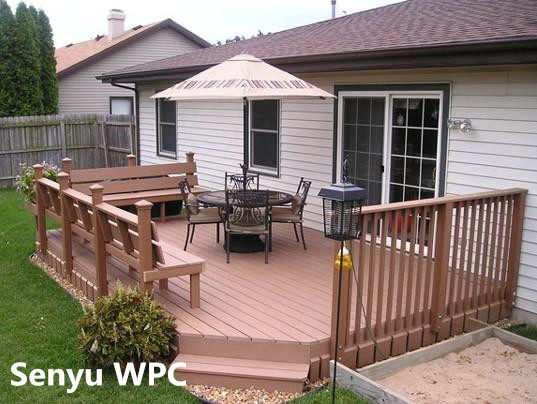OUTDOOR WPC DECKING |

Senyu WPC wood-plastic composites combines the pleasing look of wood with the functionality and manufacturing ease of plastics. These wood-plastic composites blend fine wood particles with renewable, biodegradable, reclaimed, recycled, or virgin plastic materials to make firm, smooth pellets for convenient handling and further processing. The wood fibers are obtained from waste materials generated by lumber manufacturers, which are then processed to produce a consistent reinforcing product. The use of these particles promotes the reclamation of wood waste that would otherwise be sent to landfills and ensures that no new trees are cut down to make the product. Wood-plastic composites also reduce energy use, since they melt at lower temperatures than typical plastics.
Perhaps most recognizable as decking materials, wood-plastic composites in fact display an incredibly wide range of potential applications. By adjusting the species, size and concentration of wood particles in the formulation, different properties can be achieved. Wood-plastic composites can even be foamed to make a strong lightweight material. Similarly, the chosen wood species will also have a bearing on the final product’s color. Pine fillers tend to produce products that are lighter in color compared to hardwood fillers. Larger wood particles will also have an effect on the finished look, giving the product a more natural appearance. This variability in the look and feel of products made from wood-plastic composites opens these materials up to a wide range of designer preferences. Product applications have included children’s toys (since colors can be customized, there’s no need for potentially toxic paints), dog toys (even imitating the taste of Fido’s favorite, but more splintery, wooden sticks), automotive interiors, patio furniture, garden edging and more. Wood-plastic composites are capable of achieving a huge range of characteristics while always keeping one thing in common: sustainability. As consumer attitudes towards our responsibility to the planet are changing, smarter materials offer a way forward.
